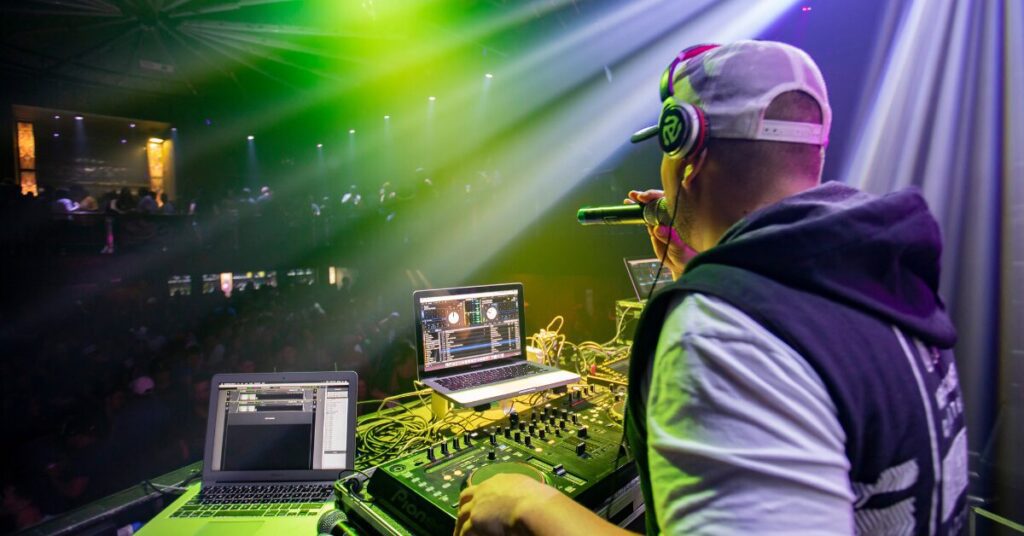12 September 2024
6 minutes read
10 Top Universities To Study Masters In Sound Engineering In USA In 2024

Key Takeaways
- The demand for skilled sound engineers is expected to grow by 21% by 2024 making a master’s in sound engineering in the USA a smart career move.
- Top US universities offer a balance of cutting-edge coursework and hands-on experience in audio technology essential for mastering your craft.
- Start your application process early focus on portfolio quality and stay motivated to navigate the competitive admission landscape successfully.
Did you know that the demand for skilled sound engineers is projected to grow by 21% by 2024, outpacing many other professions? For those considering a masters in sound engineering in the USA, this is an exciting yet crucial time to make the right educational choice. As the entertainment industry rapidly evolves, the role of sound engineers has become more critical than ever. However, aspiring professionals often face the challenge of finding the right educational path that balances both theoretical knowledge and hands-on experience in fields like digital audio, music production, and sound design.
The good news is that there are top-tier universities in the USA offering specialized master’s programs tailored to these needs, from mastering digital audio workstations to delving into the intricacies of audio post-production and acoustics. This blog will guide you through the best options for 2024, ensuring that you choose a program that aligns with your career goals, whether it’s in live sound, sonic arts, or visual media.

Why Pursue A Masters in Sound Engineering From The USA?
The USA is home to some of the world’s most advanced recording studios and music production facilities, making it a prime destination for aspiring sound engineers. In fact, the country hosts over 30% of the global music production market, providing unparalleled opportunities for students to learn and network. But why exactly should you consider pursuing a master’s in sound engineering from the USA? Here are four compelling reasons:
Cutting-Edge Recording Techniques
American universities are known for staying ahead of industry trends, offering coursework that covers the latest recording techniques. This ensures that students are well-equipped to handle the demands of modern audio production, whether it’s initial recording or post-production.
Hands-On Experience with Top Equipment
As a recording engineer, mastering the use of high-end music technology is crucial. The USA’s leading programs provide access to state-of-the-art equipment and facilities, allowing students to gain practical, hands-on experience that is vital for their careers.
Diverse Coursework and Specializations
The flexibility and diversity of the coursework in US programs allow students to tailor their education to their interests, whether they’re inclined towards multimedia production, sound design, or even the technical aspects of audio engineering.
Networking and Industry Connections
Studying in the USA opens doors to a vast network of professionals in the music and multimedia industries. This not only enhances your learning experience but also increases your chances of securing internships and job opportunities in prestigious studios after graduation.
10 Top Universities To Pursue Masters In Sound Engineering In USA
When it comes to pursuing master’s in sound production and engineering, the USA stands out with its exceptional institutions that blend theoretical learning with practical application. Whether you’re passionate about music or looking to deepen your understanding of sound, these programs offer the perfect balance. Below is a list of the top 10 universities, including details on average fees, potential salaries, and program duration.
| University | Average Fees (per year) | Average Salary (post-graduation) |
|---|---|---|
| Belmont University | $38,430 | $70,000 |
| Berklee College of Music | $44,360 | $72,000 |
| New York University (NYU) | $54,880 | $80,000 |
| University of Southern California | $61,503 | $85,000 |
| Stanford University | $55,473 | $82,000 |
| The Peabody Institute of Johns Hopkins University | $53,740 | $75,000 |
| California Institute of the Arts | $52,850 | $78,000 |
| University of Miami | $52,402 | $74,000 |
| Indiana University Bloomington | $40,836 | $68,000 |
| Middle Tennessee State University | $25,872 | $65,000 |
What Are The Career Opportunities In The Sound Engineering Field?
A career in sound engineering opens up a world of exciting possibilities, especially for those who are passionate about music and technology. With a solid foundation from a master’s degree in audio engineering, graduates can explore a wide range of roles that blend creativity with technical expertise. Whether you’re drawn to the studio or the stage, the opportunities are vast and varied. Below are some of the top career paths in the field, along with key details to help you understand the scope and potential of each role.
| Career Path | Role Description | Required Education | Average Salary |
|---|---|---|---|
| Recording Engineer | Specializes in capturing high-quality master recordings in a studio environment. | Bachelor’s or Master’s Degree | $55,000 – $80,000 |
| Live Sound Engineer | Manages sound reinforcement and audio quality during live performances. | Bachelor’s Degree, Hands-on Experience | $45,000 – $75,000 |
| Audio Post-Production Engineer | Focuses on editing, mixing, and mastering audio for films, TV, and games. | Bachelor’s or Master’s Degree | $60,000 – $90,000 |
| Music Producer | Oversees the entire production process, from initial recordings to final output. | Bachelor’s or Master’s Degree | $50,000 – $100,000 |
| Acoustic Consultant | Works on designing and optimizing spaces for better sound quality and acoustics. | Master’s Degree, Specialized Training | $70,000 – $95,000 |
| Broadcast Engineer | Manages audio quality for radio, TV, and online broadcasts. | Bachelor’s Degree, Technical Training | $50,000 – $85,000 |
| Sound Designer | Creates sound effects and audio landscapes for various multimedia projects. | Bachelor’s or Master’s Degree | $55,000 – $85,000 |
| Music Technologist | Develops and implements new music and sound technologies and tools. | Master’s Degree, Engineering Experience | $65,000 – $95,000 |
What Is The Application Process and Admission Requirements For Masters In USA?
The reality is that gaining admission into a top masters degree in audio engineering program requires more than just a passion for audio technology—it demands a rigorous application process that can be both time-consuming and stressful.

However, one of the biggest challenges students face is understanding the complex admission requirements. From standardized test scores to extensive paperwork, the process can feel like a full-time job. Many applicants struggle with meeting tight deadlines, securing recommendation letters, and crafting a compelling statement of purpose. On top of that, the competition is fierce, and international students often face additional hurdles such as visa applications and language proficiency tests. These are real issues that can make the process feel incredibly challenging.
Here’s what you will require:
| Requirement | Details |
|---|---|
| Bachelor’s Degree | A relevant undergraduate degree, typically in audio engineering, music technology, or a related field. |
| Standardized Test Scores | GRE scores may be required, though some programs may waive this requirement. |
| English Language Proficiency | International students must submit TOEFL or IELTS scores to demonstrate proficiency in English. |
| Letters of Recommendation | Usually 2-3 letters of recommendation from academic or professional references who can attest to your qualifications and potential in the field. |
| Statement of Purpose | A statement of purpose explaining your motivation for pursuing a master’s degree in audio engineering, your career goals, and why you are a good fit for the program. |
| Portfolio or Work Samples | Some programs may require a portfolio showcasing your previous engineering work or projects in audio technology. |
| Application Fee | Most universities require a non-refundable application fee ranging from $50 to $150. |
| Interviews | Some programs may require an interview, either in person or via video call, as part of the selection process. |
Conclusion
So, if you’re serious about making a mark in the sound engineering field, pursuing a master’s degree in the USA is a solid move. The programs here not only cover the technical aspects but also offer hands-on experience with cutting-edge audio technology—something that’s hard to beat. Whether you’re into recording, live sound, or even sound design, these universities provide the resources and industry connections to help you thrive.
Yes, the application process can be a bit of a grind, but that’s all part of the journey. If you’re passionate about music and committed to your craft, the effort is well worth it. Just remember to start early, stay organized, and keep your end goal in sight. With the right mindset and preparation, you’re on your way to carving out a successful career in this exciting industry.
Expert Guidance A Click Away: Have questions about your college application? Schedule your expert call now and get all the answers you need to proceed with confidence.
FAQs
What is sound engineering and what does a master’s degree in this field entail?
Sound engineering, or audio engineering, involves the technical aspects of sound production, including recording, mixing, and reproducing sound. A master’s degree in sound engineering provides advanced theoretical knowledge and hands-on experience in sound design, digital audio, and music production.
Why should I pursue a master’s degree in sound engineering?
Pursuing a master’s in sound engineering can enhance your career prospects, deepen your understanding of acoustics and audio technology, and provide access to industry-standard equipment and networking opportunities.
What are some top sound engineering programs in the USA for 2024?
Some top programs include Belmont University, Berklee College of Music, and the University of Massachusetts-Lowell. These programs offer a blend of theoretical and practical training in sound engineering.
What career opportunities are available after completing a master’s in sound engineering?
Graduates can pursue careers as recording engineers, sound designers, audio post-production specialists, live sound engineers, and more. The degree opens doors in various industries including music, film, television, and live performance.
What are the prerequisites for applying to a master’s program in sound engineering?
Applicants typically need a bachelor’s degree in a related field, such as music technology or audio production, and relevant experience in sound engineering. Programs may also require a portfolio or samples of previous work.

You can study at top universities worldwide!
Get expert tips and tricks to get into top universities with a free expert session.
Book Your Free 30-Minute Session Now! Book a call now




























